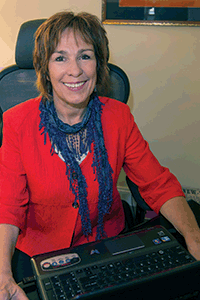Ready, set … wait
Attorneys say they’ll be prepared to handle increased demand if immigration reform passes
Ready, set … wait
Attorneys say they’ll be prepared to handle increased demand if immigration reform passes

Still, Lipinski won’t give herself the luxury of waiting. Her Blue Ridge Immigration Law Center LLC, staffed by her and two part-time legal assistants, is focused on providing legal services to immigrants living in Warrenton and the outlying rural areas, including Madison, Orange and Rappahannock counties.
When additional space in her office building came up for lease late last year, she grabbed it. Now her firm plans to hire attorneys and legal assistants who are fluent in Spanish, have a passion for helping people and are willing to work very hard.
“If reform goes through, we’re all going to be very, very busy,” states Lipinski. “It’s a risk, but I want to be ready. I don’t want to have to turn anybody away.”
Piling on
Absorbing an expanded workload won’t be easy for Virginia’s approximately 350 attorneys who specialize in immigration and naturalization law, but Charles Tievsky, an immigration attorney based in Reston and the chair-elect of the D.C.-Maryland-Virginia chapter of the American Immigration Lawyers Association (AILA), believes that they’ll be up to the task.
“The practice of law is like any other business in the sense that there are going to be ebbs and flows in demand for services,” he says, noting that Virginia’s immigration bar has handled other legislation that has affected millions of people, from the 1986 amnesty law to last year’s Deferred Action for Childhood Arrivals program. “A lot of this is going to be phased in over time, and there are a lot of first-year associates and unemployed lawyers who can be trained quickly in very narrow areas to do the initial triage to determine complications and issues and then move them up to more experienced attorneys. I would expect a lot of firms to use that model.”
Still, he acknowledges Virginia’s immigration attorneys would be under unprecedented pressure. According to the U.S. Census Bureau, more than 900,000 immigrants, or one in nine residents, made their home in Virginia in 2011, a jump of nearly 60 percent since 2000. These numbers include an estimated 210,000 immigrants who are here illegally.
If immigration reform does pass, “there is no immigration practice area that is not going to be affected,” says Tievsky. “Across the entire spectrum — from family-based to employment-based immigration law to all the various sub-specialties, including asylum and removal — there is going to be a great deal of activity.”
That’s because Senate bill 744, which passed in late June with bipartisan support, would overhaul three major areas of immigration law and enforcement.
First, there’s a pathway to citizenship for the estimated 11 million immigrants who live in the United States illegally. Second, a stepped-up security effort makes significant changes to employment eligibility forms. The bill requires most employers to use eVerify, an Internet-based system that compares employee information with government-held records to confirm the eligibility of prospective employees. Finally, the bill features numerous reforms to business immigration visas, such as the H-1B visa, in hopes of improving the ability of U.S. businesses to recruit and retain global talent. (The bill’s fate in the House of Representatives was uncertain at press time.)
Just coming up to speed on these changes will be a job in and of itself, according to Crystal Williams, executive director for AILA. “It will be a scramble,” she admits. “Immigration attorneys will basically have to relearn some of the law. And attorneys who are entering the field — and we’re seeing quite a few entering it now — will not only have to learn the new law along with everybody else, but they will need to learn the existing law, because the existing law significantly impacts how you advise people on whatever the new law is.”
Looking inward and outward
Nonetheless, Williams and others believe that the supply of immigration attorneys will be able to absorb the new demand, in part because of the growth of interest in immigration law. “More people are definitely coming into the field in anticipation of the new law,” Williams says.
AILA has seen a huge jump in its member numbers, which rose from 12,000 in 2012 to 13,000 in 2013. About 75 percent of the new members are attorneys who graduated from law school within the last three years.
Eliot Norman, a lawyer at Williams Mullen in Richmond who helps businesses recruit foreign workers, says one area of reform that will be exclusive to immigration attorneys concerns helping businesses understand changes to worker visas and determine which ones should be used to best meet the unique needs of their industry and employees.
Otherwise, he believes that attorneys in other practice areas can be relied upon to help satisfy much of the new demand. These include those specializing in personal injury, personal bankruptcy, and human resources and benefits.
“These attorneys are well-equipped to help people on the path to citizenship, especially in filling out forms and guiding people through the basic process,” he says.
Tievsky, agrees. He notes that despite the complexities of immigration law, experienced attorneys can effectively leverage assistance from other legal specialists, first-year associates, immigration paralegals and community-based organizations, as long as the lawyers play the role of team lead.
“There will be experienced people available, and there will be less experienced people, and just like any other business, you have to ensure that people are properly overseen,” he says. “And an experienced immigration attorney can do that and make certain that everything is done properly.”


















